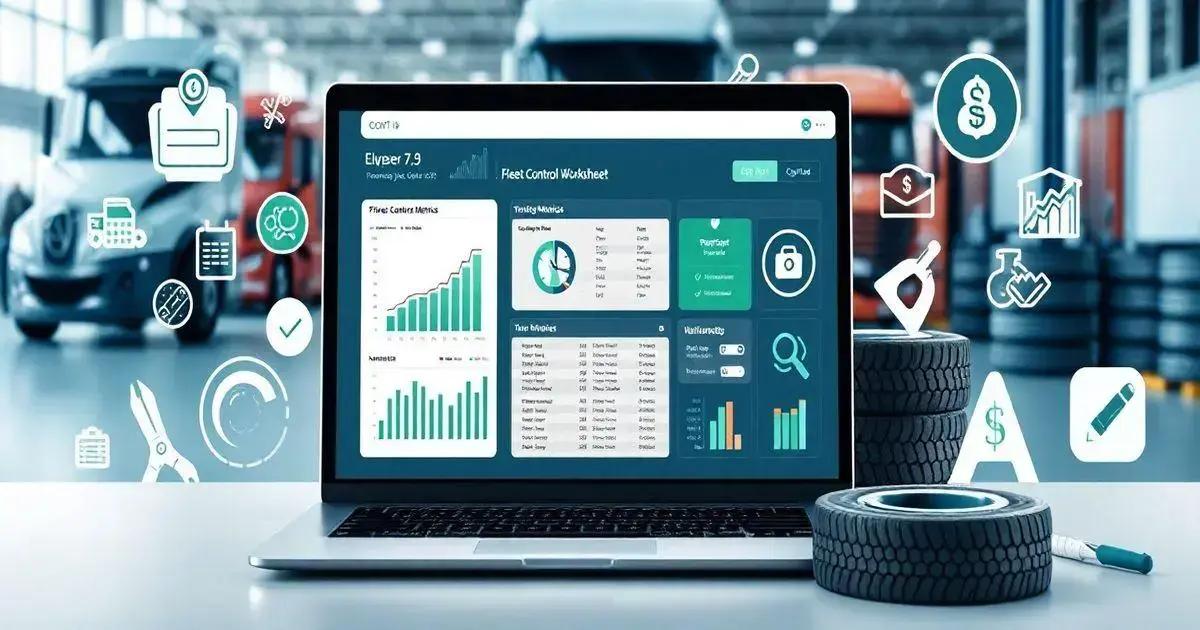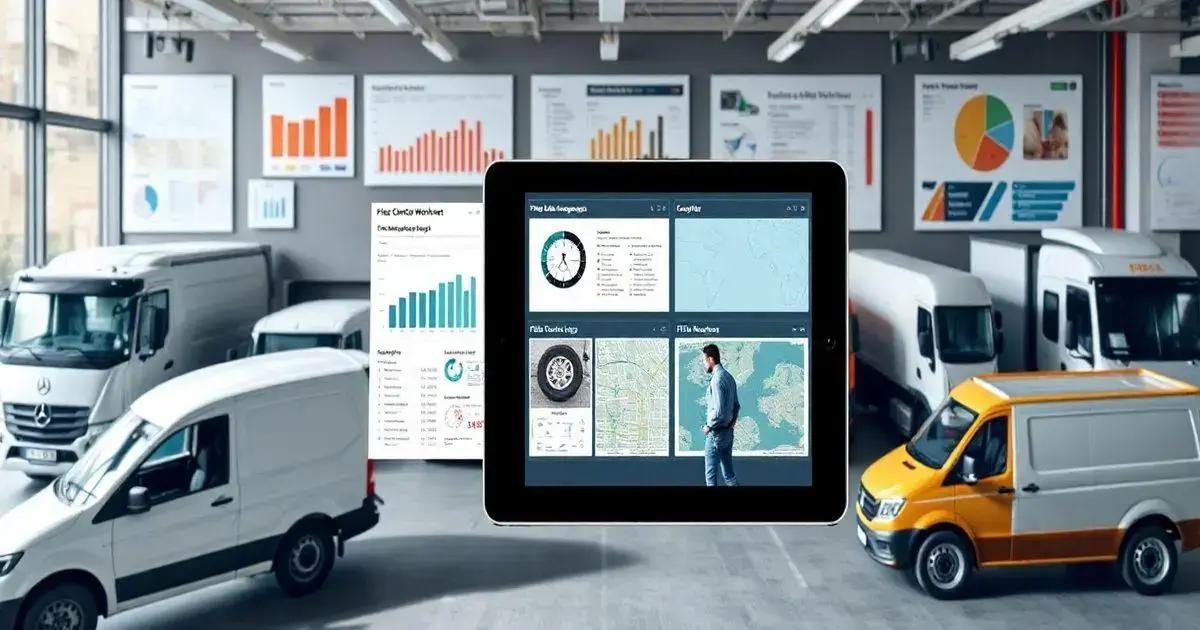The Complete Fleet Control Worksheet 7.0 for Your Business Leave a comment
The Fleet Control Worksheet 7.0 is a vital management tool for fleet managers, offering features like dashboards for vehicle performance, driver efficiency, and maintenance costs, along with streamlined registration processes, document management, travel control, tire management, and maintenance oversight to enhance safety, reduce costs, and improve operational efficiency.
Managing a fleet can be challenging, but with the Fleet Control Worksheet 7.0, you can take your management game to a whole new level. This comprehensive tool provides various features to help you track and control your fleet operations seamlessly.
From tire control to maintenance schedules, this worksheet covers all critical aspects, ensuring your vehicles are always in optimal condition and driving costs are minimized.
Initial Dashboards
Initial Dashboards
The Fleet Control Worksheet 7.0 comes equipped with a set of initial dashboards designed to provide you with insightful data at a glance. These dashboards are essential for monitoring your fleet’s performance and ensuring that everything runs smoothly.
- KM by Driver: This dashboard tracks the kilometers driven by each driver, allowing you to identify those who may need additional training or support.
- KM per Vehicle: Keep tabs on how far each vehicle has traveled. This helps in scheduling maintenance and understanding vehicle usage patterns.
- KM per Liter: This metric helps you assess fuel efficiency across your fleet, providing insights into which vehicles may require servicing or replacement.
- KM per Trip: Gain clarity on trip efficiencies by analyzing the distance covered during each trip, helping to optimize routes.
- Average Consumption per Vehicle: Understand fuel consumption trends per vehicle, ensuring that you are aware of any anomalies that may indicate mechanical issues.
- Average Consumption per Driver: This provides insights into driving habits, helping you to promote more economical driving practices among your team.
- Total General, Preventive and Corrective Maintenance: Monitor the overall maintenance activities to ensure that your vehicles are well maintained and any issues are promptly addressed.
- Maintenance Cost Average: This allows you to keep track of how much you spend on maintenance, enabling better budgeting and cost control.
- Total cost of Mechanical and Electrical Maintenance: Stay informed about your total spending on mechanical and electrical repairs, helping you to identify trends that may require attention.
- Total Tire Maintenance Cost: Tire maintenance can be a significant cost; this dashboard helps manage and predict those expenses effectively.
- Total Lubricant Cost: Keep an eye on lubricant costs to ensure your vehicles are maintained properly without overspending.
- Average cost of Mechanical and Electrical Maintenance: Knowing the average cost can help you budget for future maintenance activities more accurately.
- Average Tire Maintenance Cost: This helps in planning for future tire purchases and maintenance, thereby budgeting more effectively.
- Average cost with Lubricants: Understand your lubricant expenditure trends to identify potential savings.
- Vehicles in Transit: Keep track of how many vehicles are currently in transit, aiding in logistics and operational planning.
- Tires in Transit: Similar to vehicles, this metric helps track tires that are currently in use, ensuring that you have a clear understanding of your resources.
- Delayed Vehicle Documents: Monitor any pending paperwork that might delay operations or compliance.
- Delayed Driver Documents: Just like vehicle documents, ensuring that driver documents are up to date is crucial for preventing legal issues.
- Delayed Preventive Maintenance: Keeping tabs on preventive maintenance schedules helps minimize breakdowns and prolong vehicle lifespan.
- Total Cost Versus Shipping: Evaluate your costs against shipping fees to ensure profitability and pinpoint areas for improvement.
- Fuel, Maintenance and Other Costs: This holistic view of costs associated with your fleet helps you make informed decisions regarding operations and budgeting.
With these dashboards, the Fleet Control Worksheet 7.0 empowers fleet managers with the necessary tools to make informed decisions and ensure efficient operations. Start utilizing these features to keep your fleet running smoothly and profitably!

Registration Processes
The Fleet Control Worksheet 7.0 simplifies the registration processes for both drivers and vehicles, allowing fleet managers to maintain accurate and comprehensive records. Effective registration helps in tracking performance, ensuring compliance, and maintaining safety standards.
Registration Processes
- Driver Registration: Create detailed profiles for each driver, including personal information, licenses, certifications, and contact details. This ensures that you have quick access to vital information in case of emergencies or audits.
- Vehicle Type Registration: Keep a record of the different vehicle types in your fleet. This includes information such as make and model, capacity, and purpose. Having this data helps in managing your fleet more efficiently and planning for vehicle maintenance or replacement.
- Mechanical and Electrical Services Registry: Document all mechanical and electrical service records for each vehicle. This includes dates of service, types of service performed, and any parts replaced. A detailed service history helps in identifying recurring issues and evaluating service providers.
- Tire Service Registration: Record details about tire replacements and maintenance. This includes tire types, installation dates, and mileage intervals. Managing tires effectively can lead to cost savings and improved vehicle performance.
- Lubricant Services Register: Track the usage of lubricants for each vehicle, including types and quantities used. Understanding lubricant consumption can help in optimizing maintenance schedules and costs.
- Register of Workshops and Suppliers: Keep a comprehensive list of trusted workshops and suppliers for maintenance services, parts, and tires. This simplifies the process of finding reliable service partners when needed.
- Expenditure Type Register: Document all types of expenditures related to fleet operations, including fuel, maintenance, and repairs. This helps in budgeting and financial analysis of fleet costs.
- Refueling Station Registration: Maintain a list of refueling stations used by your fleet. Recording the locations can help in optimizing fuel purchases and ensuring that drivers are aware of accessible refueling points along their routes.
- Fuel Type Register: Track the types of fuel used by each vehicle in your fleet. Different vehicles may require specific fuel types, and this record helps in ensuring compliance with manufacturer recommendations and regulations.
By implementing these registration processes within the Fleet Control Worksheet 7.0, fleet managers can ensure that all necessary information is readily available, contributing to smoother operations and improved decision-making.
Document Management
Efficient document management is crucial for fleet operations, and the Fleet Control Worksheet 7.0 provides robust tools to help you keep track of essential documents associated with both drivers and vehicles. Proper documentation not only ensures regulatory compliance but also enhances operational efficiency.
Document Management
- Driver Document Control: Maintain organized records of all driver-related documents, including licenses, certifications, medical examinations, and training records. This section ensures that you meet legal requirements and have ready access to critical information when needed.
- Vehicle Document Control: Keep track of all vehicle documents such as registration papers, insurance documents, and maintenance records. Document control helps in ensuring that every vehicle complies with state regulations and safety standards.
- Tire Documentation: Store information related to each vehicle’s tires, including purchase receipts, warranty documents, and service records. This helps in managing tire lifecycle effectively, preventing unscheduled downtime.
- Maintenance Service Records: Document all services performed on each vehicle, including preventive and corrective maintenance. This record not only helps in tracking service history but also assists in budgeting for future maintenance needs.
- Compliance Document Management: Maintain a repository of all compliance-related documents, including safety inspections and regulatory compliance reports. Staying compliant is vital for avoiding penalties and ensuring the safety of your fleet.
- Incident Reports: Keep detailed records of any incidents involving your fleet, including accidents or damages. Documenting these events is crucial for insurance claims, legal matters, and improving safety protocols.
With the Fleet Control Worksheet 7.0, you can efficiently manage all documents related to your fleet. This organized approach not only saves time during audits and inspections but also ensures that your fleet operates smoothly and legally.

Travel Control Features
The Fleet Control Worksheet 7.0 includes essential travel control features that enable fleet managers to monitor and manage all travel-related activities efficiently. These features help in optimizing routes, reducing costs, and ensuring that all trips are well documented.
Travel Control Features
- Cargo Control Linked to Trips: Track all cargo associated with trips, ensuring that shipments are paired with the right vehicle and driver. This feature helps in managing inventory and streamlining logistics.
- Vehicle Control: Monitor which vehicles are on the road at any given time and their current status. This includes tracking trip progress, ensuring that vehicles are utilized efficiently, and preventing unauthorized use.
- Driver Control: Maintain oversight of which drivers are on duty, their routes, and performance metrics. This feature allows managers to evaluate driver efficiency and adherence to schedules.
- Supply Control: Manage supplies needed for travel, such as fuel and maintenance supplies, to ensure that all vehicles have what they need to complete their trips without delays.
- Control of All Travel Expenses: Document and analyze all expenses incurred during trips, including fuel costs, tolls, and maintenance fees. This helps in budgeting and identifying areas for cost savings.
By leveraging these travel control features, the Fleet Control Worksheet 7.0 empowers fleet managers to enhance operational efficiency, improve accountability, and reduce costs associated with fleet travel.
Tire Control Insights
The Fleet Control Worksheet 7.0 provides invaluable tire control insights that are essential for maintaining the performance and safety of your fleet. Proper tire management is not only crucial for safety but also impacts fuel efficiency and overall fleet operations.
Tire Control Insights
- Identification for Each Tire: Keep a detailed record of each tire’s identification, including make, model, and serial numbers. This allows for easy tracking and management of tire performance and service history.
- Tire Change Schedule by KM: Set up a tire change schedule based on kilometers driven. This proactive approach ensures that tires are replaced at the right time, thereby reducing the risk of blowouts and accidents.
- Signal of How Much KM is Left to Change the Tire: Monitor the remaining kilometers before a tire needs to be changed. This feature provides alerts when tires approach the end of their service life, allowing you to plan replacements in advance.
- Status per Action: Keep track of each tire’s status, including actions required such as allocation to a vehicle, removal from service, scrapping, or maintenance. This comprehensive approach helps in managing tire inventory efficiently and ensuring that only safe, well-maintained tires are in use.
By utilizing the tire control insights provided in the Fleet Control Worksheet 7.0, fleet managers can significantly enhance tire longevity, improve vehicle safety, and reduce costs associated with premature tire replacements.

Maintenance Control Overview
The Fleet Control Worksheet 7.0 includes a comprehensive maintenance control overview that is essential for keeping your fleet in optimal working condition. Regular maintenance not only prolongs the lifespan of vehicles but also enhances safety and operational efficiency.
Corrective and Preventive Maintenance Type: Classify maintenance activities into corrective and preventive types. This distinction helps in scheduling routine checks proactively and addressing issues promptly when they arise.
Maintenance by Vehicle: Track maintenance activities for each vehicle individually. This feature enables fleet managers to have a detailed history of services performed, including oil changes, tire rotations, and inspections.
Maintenance by Mechanical and Electrical Type, Tire and Lubricants: Monitor maintenance activities categorized by mechanical and electrical systems, as well as tire and lubricant services. This granularity helps in identifying trends and addressing specific issues within your fleet.
Maintenance Cost: Keep detailed records of all maintenance expenses, allowing for better budgeting and financial planning. Understanding maintenance costs is crucial for identifying areas to cut expenses and optimizing maintenance schedules.
Preventive Maintenance Schedule: Establish a preventive maintenance schedule to ensure timely servicing of each vehicle. This proactive approach minimizes the chances of unexpected breakdowns and enhances vehicle reliability.
Preventive Maintenance Signal: Implement alerts for upcoming preventive maintenance tasks. This ensures that fleet managers stay on top of required services, which can help in avoiding larger, costlier repairs in the future.
Status by: Categorize maintenance activities based on their status—scheduled, accomplished, and delayed. This helps in managing timelines effectively and ensuring that maintenance tasks are completed in a timely manner.
By leveraging the maintenance control features of the Fleet Control Worksheet 7.0, fleet managers can ensure that their vehicles are maintained to the highest standards, ultimately leading to safer, more efficient fleet operations.
Conclusion
In conclusion, the Fleet Control Worksheet 7.0 is an indispensable tool for fleet managers seeking to enhance their operational efficiency and maintain their vehicles effectively.
With its comprehensive dashboards, streamlined registration processes, meticulous document management, and robust travel and maintenance control features, this worksheet addresses all critical aspects of fleet management.
By utilizing the insights provided in the worksheet, fleet managers can make informed decisions that lead to improved safety, reduced costs, and optimized performance.
Investing in the right tools, like the Fleet Control Worksheet 7.0, is essential for navigating the complexities of fleet operations and achieving long-term success.
Start implementing these features today to transform your fleet management approach and ensure your vehicles are always ready to hit the road!
FAQ – Frequently Asked Questions about Fleet Control Worksheet 7.0
What are the key features of the Fleet Control Worksheet 7.0?
The key features include initial dashboards for monitoring performance, registration processes for drivers and vehicles, document management, travel control insights, and comprehensive maintenance control.
How can I manage tire maintenance effectively using this worksheet?
You can track tire identification, set schedules for tire changes, monitor remaining kilometers before replacements, and manage statuses for each tire to ensure efficient tire maintenance.
Is the Fleet Control Worksheet suitable for all types of vehicles?
Yes, the worksheet is designed to accommodate various vehicle types, making it suitable for diverse fleets.
Can I integrate this worksheet with other fleet management systems?
While the Fleet Control Worksheet 7.0 is a standalone tool, you can manually input data from other systems to maintain comprehensive records.
How do I ensure compliance with regulatory requirements using this worksheet?
By keeping accurate records of driver documents, vehicle registrations, and maintenance logs, you can easily stay compliant with all regulatory requirements.
Is there customer support available if I encounter issues with the worksheet?
Yes, customer support is available to assist with any issues you may encounter while using the Fleet Control Worksheet 7.0.

